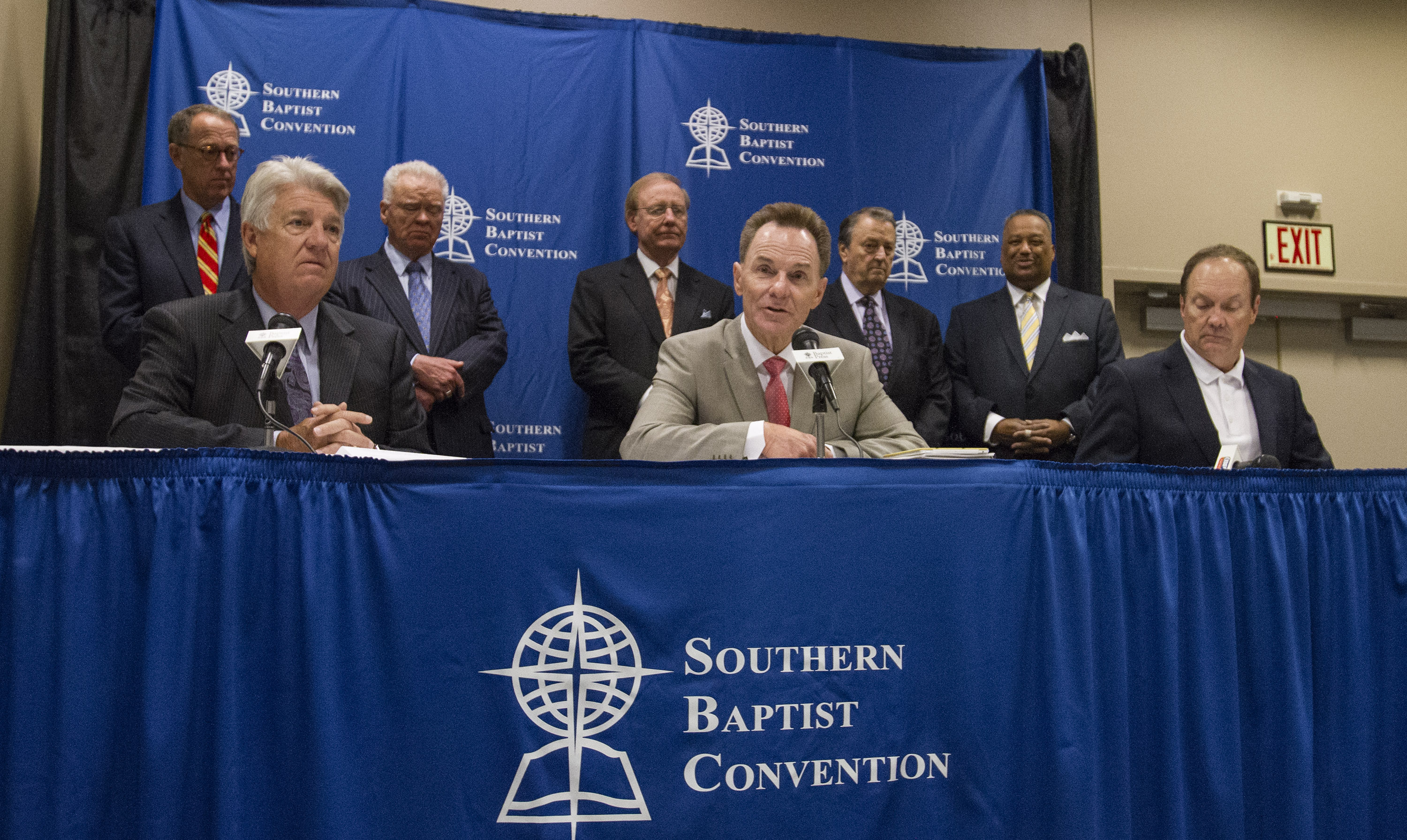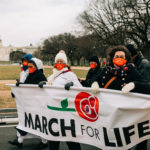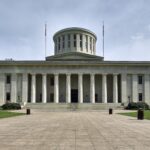
NASHVILLE, Tenn. (BP)–A third of state Baptist conventions this fall reduced their budgets for next year in order to address declines in giving by churches. Meanwhile, 15 conventions affirmed marriage as a union between one man and one woman.
Financial cutbacks were approved by messengers in Georgia, Illinois, Kansas-Nebraska, Louisiana, Mississippi, North Carolina, Oklahoma, Tennessee, the Baptist General Convention of Texas and the Baptist General Association of Virginia. Slight decreases in next year’s budgets were approved in New England, New York and West Virginia. Kansas-Nebraska messengers expressed a determination to restore the shortfall that will affect SBC ministries.
Despite the budget decrease in Louisiana, messengers voted to raise the SBC allotment for the first time since 1988 by a quarter-percent of budget. Nevada Baptists raised the portion forwarded to Southern Baptist ministries to 28.25 percent, up from 28 percent. New York Baptists increased their CP allotment by a half percent to 26 percent, while Pennsylvania/South Jersey Baptists increased what they will send to the SBC by 0.1 percent to 24.6 percent. In California, however, messengers lowered the portion they will send the SBC from 30 percent to 27 percent, and stating an intention to repay the 3 percent when funds are available.
Most state conventions increased their budget for next year, including Arizona, up 1.09 percent; Florida, up 0.25 percent; Utah-Idaho, up 1 percent; Indiana, up 0.6 percent; Maryland/Delaware, up 3 percent; Montana, up 1.8 percent, New Mexico, up 6.4 percent; Nevada, up 1.18 percent; Pennsylvania/South Jersey, up nearly 1 percent; Southern Baptists of Texas Convention, up 18 percent; and Southern Baptist Conservatives of Virginia, 16.67 percent. A few state conventions reported flat budgets.
A motion failed in South Carolina to study incrementally increasing the percentage of Cooperative Program receipts forwarded to the Southern Baptist Convention to 50 percent — up from the current 40/60 SBC/state convention allocation. The messenger hoped to see more Cooperative Program money making its way to the International Mission Board in light of a freeze on missionary appointments. An opponent of the motion described IMB President Jerry Rankin’s call for increased giving to Lottie Moon Christmas Offering for International Missions as the best solution to the IMB budget crisis.
Utah-Idaho Baptists also rallied churches to support the boost in LMCO giving. In Arkansas, outgoing President Jim Lagrone challenged the newly elected president to call together a group of Arkansas Baptists to propose “genuine reform and re-tooling so that we can better meet the needs of the mission field this century and fulfill the Great Commission.”
In several states messengers passed resolutions encouraging churches to promote the Cooperative Program, including Maryland/Delaware, Mississippi, Oklahoma and Southern Baptists of Texas Convention. The resolution in Oklahoma specifically encouraged Cooperative Program-supported ministries to “resist the temptation of making direct appeals to our churches for operational funding.” Oklahomans also expressed concern at a 30 percent decline in CP giving from the churches since 1986. Maryland/Delaware Baptists encouraged all churches to move toward an allocation of at least 10 percent of their total budgets for the Cooperative Program and 5 percent to local associations. The executive director in South Carolina issued a similar challenge.
The executive director and outgoing president of Baptist General Convention of Texas asked churches to adopt a giving plan that would assign 79 percent of their missions budget to the BGCT and allow church members to decide where to send the remaining 21 percent, whether to the SBC or the Cooperative Baptist Fellowship.
In a few state conventions, particular ministries were affected by cuts. Missouri Baptists voted to defund William Jewell College of more than $1 million, redirecting the money to Midwestern Baptist Theological Seminary, Hannibal-LaGrange College, Southwest Baptist University, Missouri Baptist Children’s Home, church planting by the state convention, a new Iraq partnership and a reserve account.
The Baptist General Association of Virginia escrowed funds to Averett University due to unresolved concern that an AU professor condoned homosexuality and a guest speaker questioned biblical authority. The BGAV increased its support of the Washington-area John Leland Center for Theological Studies by 300 percent, placing it directly within the Virginia portion of the budget. The Center for Baptist Heritage and Studies received a 40 percent cut in BGAV funding.
For the fourth year in a row, the Baptist Faith and Message was discussed in some state convention meetings. In Maryland/Delaware and Kentucky, messengers affirmed the various Baptist Faith and Message statements over the years as expressions of Southern Baptist beliefs. Maryland/Delaware messengers passed an operating document affirming churches that adopt “the Baptist Faith and Message 2000 or 1963 or similar statement in accord with the beliefs expressed in those Southern Baptist documents.” One messenger called the document divisive, while another portrayed it as a guideline defining Baptists. In spite of some debate, Illinois Baptists overwhelmingly approved a resolution affirming the Baptist Faith and Message adopted in 1925 and the subsequent revisions as representing a consensus of Baptist beliefs that may be used by local churches and associations.
Specific support of the 2000 revision was approved by New York Baptists. Missouri Baptists approved the 2000 BF&M confessional statement for the MBC staff. Michigan Baptists clarified that they “affirm in word and spirit the 2000 edition of the Baptist Faith and Message,” noting the value of re-clarifying biblical truth and teaching to respond to current cultural controversies concerning same-sex “marriage,” the role of women, the nature of the family and other issues of gender and sexuality.
In West Virginia, messengers affirmed the inerrancy of Scripture and the exclusivity of the Gospel. South Carolina Baptists affirmed baptism by immersion as the only biblical, historical and proper mode of Christian baptism. The resolution noted that churches no longer requiring baptism by immersion for membership have chosen not to be in good standing with the convention.
Alabama Baptists, Southern Baptists of Texas Convention messengers and Southern Baptist Conservatives of Virginia expressed appreciation to President George W. Bush for signing the recent ban on partial-birth abortion. Missouri Baptists praised state legislators voting to override their governor’s veto of a pro-life bill. Southern Baptists of Texas Convention messengers praised their governor for his support of the Defense of Marriage Act, an Unborn Victims of Violence Act, the Woman’s Right to Know Act and other family friendly legislation. Alabama Baptists resolved to pray for the families affected by all acts of abortion.
Support for military personnel and veterans was expressed in Alabama, Arizona, Utah-Idaho, Mississippi, Oklahoma, South Carolina and West Virginia. Prayer for President Bush and other elected leaders was encouraged in Alabama, Arizona, South Carolina, Oklahoma, Tennessee, Utah-Idaho and West Virginia. West Virginia messengers also affirmed President Bush for nominating “well-qualified candidates” to fill vacancies in the judiciary and repudiated “partisan obstructionism” by U.S. senators.
Support for the Federal Marriage Amendment came from Alabama, Arkansas, Indiana, Kansas-Nebraska, Mississippi, Missouri, South Carolina, Tennessee and Southern Baptists of Texas Convention.
Various resolutions supported a traditional biblical definition of the family and, in most cases, stated opposition to same-sex “marriage.” Such resolutions were passed in Alabama, Louisiana, Maryland/Delaware, Michigan, New England, New Mexico, Tennessee, Southern Baptists of Texas Convention, West Virginia, New Mexico, Oklahoma and Tennessee. Included in some of the resolutions were references to the sin of homosexuality as well a demonstration of Christian love toward homosexuals.
Alabama Baptists called upon ministers to commit to perform only those marriages as defined by the Bible and for churches “to elect only those leaders who are in or who support Bible-based relationships.” In Maryland-Delaware, additional comment supported Anglicans who had objected to the affirmation of a homosexual church leader. New Mexico Baptists encouraged support of a petition drive to reverse a state “gay rights” law while Southern Baptists of Texas Convention criticized the U.S. Supreme Court decision on Texas sodomy law. SBTC messengers further stated disagreement over the Supreme Court’s ruling that Texas law prohibiting homosexual sodomy was not legally valid.
Messengers in Alabama, Kansas-Nebraska, Indiana, New Mexico, Southern Baptists of Texas Convention and West Virginia passed resolutions emphasizing religious liberty. SBTC passed a resolution addressing Christian citizenship, encouraging participation in the 2004 elections. A resolution on “Classical Tolerance Vs. New Tolerance” expressed the opposition of Oklahoma Baptists to the cultural trend of a “new tolerance” worldview that “has created a new civil right, which includes the right not to be offended.” Messengers affirmed that “absolute truth is unchanging and decided by God and the essential standard of absolute truth is based on the nature and character of God as we find it declared in God’s Word.”
Various statements of support for the phrase “one nation under God” in the Pledge of Allegiance passed in Missouri, Tennessee and by Southern Baptist Conservatives of Virginia. Support of display of religious symbols and words in public places was expressed in Alabama, Missouri and South Carolina.
Opposition to gambling was expressed in Alabama, Kansas-Nebraska, Louisiana, Maryland-Delaware, Oklahoma, South Carolina and West Virginia, while Kansas-Nebraska Baptists encouraged statewide prohibition of liquor sales. Maryland-Delaware Baptists also declared support of the Boy Scouts of America.
Churches of the Baptist General Convention of Texas were encouraged to minister to undocumented immigrants and to reach out to those whose lives have been impacted by alcohol abuse through twelve-step programs and other ministries. A North Carolina resolution expressed concern for those who have lost jobs in North Carolina.
Arizona Baptists celebrated their 75th anniversary; Dakota Baptists, their 50th; New England Baptists, their 20th. Minnesota-Wisconsin Baptists celebrated two anniversaries: the 50th year of Baptist work in their states and the 20th anniversary of the founding of their two-state convention.
Dakota Baptists endorsed a name change to Dakota Baptist Convention in moving to state convention status. New executive directors were welcomed in Illinois, Wendell Lang, and in Wyoming, Randy Sprinkle, while Jim Hamilton was elected by the Dakotas’ executive board the day after the annual meeting. SBTC announced plans to move in the spring from leased office space into its own convention building that will be free of debt.
Arkansas Baptists heard a report on racial harmony and diversity that encouraged intentional multi-ethnicity at all levels of Baptist life while urging churches to drop racial stereotypes. Meanwhile, the Baptist Convention of Pennsylvania-South Jersey held its annual meeting in an African American church for the first time.
New England Baptists voted not to endorse next year’s Vacation Bible School curriculum from LifeWay Christian Resources due to concerns by some Asian Americans that the “Rickshaw Rally” theme is a poor representation of the Asian culture, instead suggesting use of an alternative LifeWay resource for VBS during the coming year. LifeWay subsequently issued a statement in response, quoting Mary Katharine Hunt, VBS division project manager, as saying, “We appreciate the gracious way in which the BCNE’s messengers affirmed their support of LifeWay, expressed their concerns about our VBS curriculum and pledged to continue working with us in the days ahead. However, we are disappointed with the passing of the resolution and disagree in the strongest possible way with its tenets. Churches nationwide, including many Asian churches, are telling us they will use the curriculum because of its strong biblical content, clear message of Jesus and the respectful way in which it lifts up another culture. For every concern raised by an Asian American, we are receiving dozens of positive responses from Asian Americans that tell us we are fulfilling our intent to lift up another culture and share the message of hope for all people in Jesus Christ.”
Alabama Baptists expressed thanks for the ministry and dedication of bivocational ministers who serve in 51 percent of the state’s 3,200 congregations. Pastors were encouraged to preach specifically on “Calling Out the Called” and to increase opportunities for lay involvement in ministry. Minnesota-Wisconsin Baptists also commended bivocational ministers. Maryland-Delaware encouraged churches to participate in the Annuity Board’s Adopt An Annuitant ministry.
Mississippi Baptists defeated a proposed constitutional amendment to specifically exclude Cooperative Baptist Fellowship members from leadership positions, and then approved a bylaws amendment encouraging convention loyalty. The Baptist General Convention of Texas founded a new missions network, “WorldconneX,” to assist local churches in their efforts to support missions and missionaries.
North Carolina Baptists heard a report clarifying that a giving plan that sends mission funds to the Cooperative Baptist Fellowship does not violate the convention’s constitution. Messengers rejected a call for cutting funding from the Biblical Recorder, the state Baptist newspaper. North Carolina Baptists affirmed a decision to remove McGill Baptist Church from the convention for baptizing two men presumed to be homosexuals.
In anticipation of the 2004 Southern Baptist Convention annual meeting in Indianapolis, Indiana Baptists committed to particular hours during which they will pray each week, covering 145 of the 168 hours.
–30–
Art Toalston contributed to this article.



















